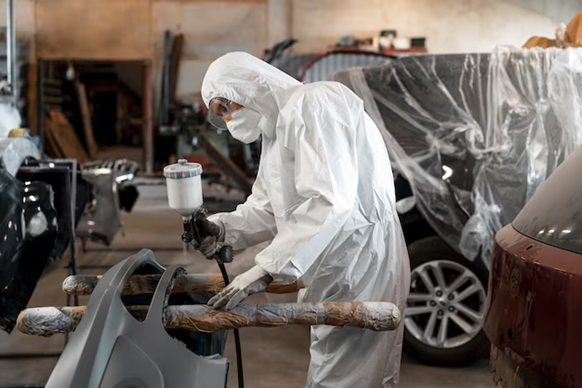Auto Body Technician

Diploma in Auto Body Technician
Duration: Typically 1-2 year
AUTTEC 100: Introduction to Automotive Technology
- Overview of the automotive industry
- Safety procedures and protocols
- Basic automotive tools and equipment
AUTBO 100: Auto Body Repair Fundamentals
- Introduction to automotive body parts
- Dent repair techniques
- Basic sanding and surface preparation
AUTCRT 100: Collision Repair Technology
- Understanding vehicle collision dynamics
- Frame straightening and alignment
- Panel replacement and repair
AUTFIN 100: Auto Paint and Refinishing
- Color matching and mixing
- Spray gun operation
- Priming, painting, and clear-coating
AUTWEL 100: Auto Body Welding
- Welding equipment and techniques
- Welding safety
- Metal joining and repair
AUTBPR 100: Auto Body Panel Replacement
- Techniques for removing and replacing damaged panels
- Welding and adhesives for panel attachment
- Alignment and fitment
AUTELEC 100: Automotive Electrical Systems
- Basic electrical theory
- Wiring diagrams and troubleshooting
- Battery, starter, and alternator systems
AUTGLAS 100: Automotive Glass Installation and Repair
- Windshield and window replacement
- Chip and crack repair
- Weather stripping and sealant application
AUTFIN 102: Custom Paint and Finishing Techniques
- Advanced paint application methods
- Custom designs and graphics
- Clear-coat application and finishing
AUTRES 100: Restoration and Customization
- Classic car restoration
- Customization and modification techniques
- Historical restoration principles
AUTBES 100: Auto Body Estimating and Shop Management
- Estimating repair costs
- Parts ordering and inventory control
- Customer service and shop operations
AUTJOB 100: Internship or Cooperative Education
- Real-world experience in an auto body shop
- Practical application of skills learned in class
Networking with industry professionals
Upon completing the program, students are eligible to pursue certifications from organizations like the National Institute for Automotive Service Excellence (ASE) or the Inter-Industry Conference on Auto Collision Repair (I-CAR). These certifications can enhance job prospects and demonstrate competence to potential employers.
Students have to contact the school administration if they want to take extra credits or transfer credits to pursue the Diploma Certificate or Associate of Applied Science (A.A.S.) Degree in their field of interest. Students will select required number courses in each of the areas listed to meet general education requirements graduation for the A.A.S. Some of these courses can be transferred directly from and to the university system and may be substituted for recommended courses on the outline. Students should speak with an advisor before doing so these selective courses are required for all students.
- Selected Communication Course (Choose two for Diploma or three for the Associate)
ENGL 100: Fundamentals of Speech
CPL 100: Career Planning
CPL 101: Communications and Career Strategies
ENGL 101: Composition
ENGL 102: composition
- Selected Mathematics Course (Choose two for Diploma or three for the Associate)
MATH 100:General Math
MATH 101:Intermediate Algebra
MATH 102:College Algebra
- Selected Social Science Course (Choose two for Diploma or four for the Associate)
ECON 105:Leadership
ECON 101:Principles of Microeconomics I
ECON 102:Principles of Macroeconomics II
SOC 101:Introduction to Sociology
PSYC 101: Introduction to Psychology
HIST 101: History
